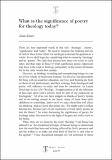Files in this item
What is the significance of poetry for theology today?
Item metadata
| dc.contributor.author | Jones, Joan | |
| dc.date.accessioned | 2017-09-01T11:02:10Z | |
| dc.date.available | 2017-09-01T11:02:10Z | |
| dc.date.issued | 2017-06-01 | |
| dc.identifier.citation | Jones, J. (2017). What is the significance of poetry for theology today? Theology in Scotland, 24(1), 51-61 | en_US |
| dc.identifier.issn | 1465-2862 | en_US |
| dc.identifier.uri | https://ojs.st-andrews.ac.uk/index.php/TIS/article/view/1518 | en_US |
| dc.identifier.uri | https://hdl.handle.net/10023/11588 | |
| dc.description.abstract | Joan Jones begins this essay by exploring what is meant by the terms ‘theology’ and ‘poetry’. ‘Theology’ is defined as the disciplined attempts of human beings to understand God. That is, the effort to understand how the world is affected by God’s presence and activity, what kind of God he is, and what his purpose is. Jones then turns to how a knowledge of God might be expressed. Might this be poetically? This could be of help in theology’s disciplined search for perfect expression. The fact is, however, that theology and poetry have always worked together, be it in Scripture, liturgy or psalms and hymns. In turn, poetry often expresses theological truths. Is poetry, then, more significant than theology in the early twenty-first century? Jones answers this question by observing that, currently, personal self-definition is much more likely to take place through subjective means than through social objectivity, as was once the case. Jones concludes by pointing to the great outpouring of new liturgy evidenced in praise songs and poetry, which demonstrate both the potential of faith’s reality and relevance and its significance for twenty-first-century theology. | en_US |
| dc.language.iso | en | en_US |
| dc.publisher | St Mary's College, University of St Andrews | en_US |
| dc.relation.ispartof | Theology in Scotland | en_US |
| dc.rights | Copyright (c) 2017 Joan Jones. This work is licensed under a Creative Commons Attribution-NonCommercial 4.0 International Licence. | en_US |
| dc.rights.uri | http://creativecommons.org/licenses/by-nc/4.0/ | * |
| dc.subject | Theology | en_US |
| dc.subject | Poetry | en_US |
| dc.subject | Laurie Green | en_US |
| dc.subject | Ian Fraser | en_US |
| dc.subject | Kathy Galloway | en_US |
| dc.subject | Rowan Williams | en_US |
| dc.subject | Thomas Merton | en_US |
| dc.subject | Hymns | en_US |
| dc.subject.lcc | BR1.S3T5 | en_US |
| dc.subject.lcsh | Theology--Study and teaching--Scotland | en_US |
| dc.subject.lcsh | Theology, Doctrinal--Scotland | en_US |
| dc.title | What is the significance of poetry for theology today? | en_US |
| dc.type | Journal article | en_US |
| dc.description.version | https://doi.org/Publisher PDF | en_US |
| dc.publicationstatus | Published | en_US |
| dc.status | Peer reviewed | en_US |
The following licence files are associated with this item:
This item appears in the following Collection(s)
Except where otherwise noted within the work, this item's licence for re-use is described as Copyright (c) 2017 Joan Jones. This work is licensed under a Creative Commons Attribution-NonCommercial 4.0 International Licence.
Items in the St Andrews Research Repository are protected by copyright, with all rights reserved, unless otherwise indicated.


